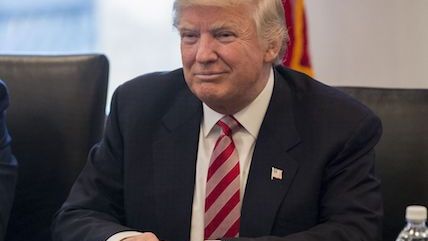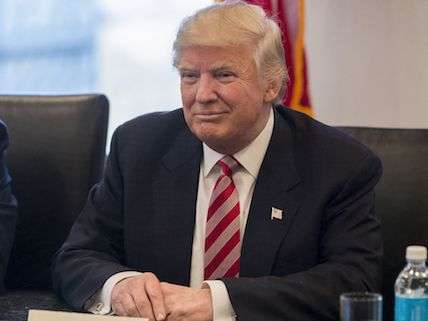Will the Ex-Im Bank Enable Boeing's Deal With Iran?
President-elect Trump could kill the bank, just to be sure.


After months of negotiations and political maneuvering, Boeing finally sealed a $17 billion deal with Iran. The cash will buy 80 aircraft to replace some of the 400 outdated state-owned Iran Air planes. The sale to the Iranian carrier is a direct result of a nuclear accord that removed sanctions on Tehran.
There is no doubt that this is a great deal for Boeing's bottom line because the company will be able to expand its reach and profits to a new and lucrative market. Also, though commerce doesn't end wars, we know from history that trading countries have stronger incentives to stay as far away from conflict with each other as possible and that protectionism tends to induce conflicts. As 19th-century economist Frederic Bastiat said, "when goods don't cross borders, soldiers will." In other words, selling aircraft to Iran won't fundamentally change the Iranian leaders' despicable behavior, but it may make them think twice before they act up.
That being said, there are two things I know for sure:
First, the Boeing deal makes President-elect Donald Trump's promise to tear up the Iranian deal much harder. As the Cato Institute's Chris Preble told me, if Trump were to tear up the nuclear deal, he would be "taking money out of Boeing's coffers," and you can be sure the company will put up a terrible fight by claiming that workers would be hurt. Preble summed it up nicely: "This sale adds to the political costs of reimposing sanctions."
Second, we must make sure that no taxpayer money will be involved in the process—and unfortunately, that's not out of the question. Boeing is the No. 1 beneficiary of the Export-Import Bank of the United States, an agency that issues taxpayer-backed loans and insurance products to foreign consumers to buy U.S. goods. Its critics even call it the "Bank of Boeing."
Ex-Im Bank supporters claim that these fears are unfounded because the Foreign Assistance Act makes it illegal for the bank to do business with state sponsors of terrorism. But that can be changed. After all, as we saw with the Carrier debacle, many Republicans, led by Trump, seem friendly to the idea that it's the role of the federal government to actively create or retain jobs in America through aggressive intervention and targeted government-granted privileges. As such, we can expect that they will fall prey to the illusion that Ex-Im loans for Iran to buy Boeing planes could boost jobs and help workers in America, making a change to the law justifiable.
Do you think this would never happen because Iran is a terrorist state? Then explain why, when Rep. Ed Royce, R-Calif., offered an amendment in 2015 that would have prohibited the Ex-Im Bank from doing business with any country on the State Department's list of state sponsors of terrorism, 63 Republicans joined with almost all Democrats to defeat it.
Another argument for allowing Ex-Im to back Boeing sales to Iran is that European governments are doing it. The Wall Street Journal already reported that "the British export-credit agency in January said the organization was 'open for business' in Iran, echoing a sentiment at other European government lending institutions." With Airbus having a similar deal for jet sales to Iran pending, it won't be long until Boeing comes crying to Congress that it's unfair for Airbus to be subsidized when it isn't.
These subsidies will be good for Airbus and Boeing, but they'll be a net negative for the overall economy. (I assume there will be plenty of lawmakers willing to lift the restriction for such heavyweight political contributors as Boeing, the Chamber of Commerce and the National Association of Manufacturers. In 2015, they spent roughly $40 million lobbying on Ex-Im-related issues.)
Finally, even if the restriction on subsidizing deals with Iran were not to be lifted, we wouldn't be able to verify that the bank is actually following the law. The data made available by Ex-Im to the public and to lawmakers are incredibly bad. Many of the foreign buyers' countries aren't listed, except as "multiple countries." A third of the foreign buyers are labeled "unnamed."
And many of the U.S. beneficiaries aren't listed, either. It's hard to trust when you can't actually verify.
Of course, there is a way out of all these questions: President-elect Trump could kill the Ex-Im Bank, causing all these concerns to immediately go away.
COPYRIGHT 2016 CREATORS.COM


Show Comments (113)